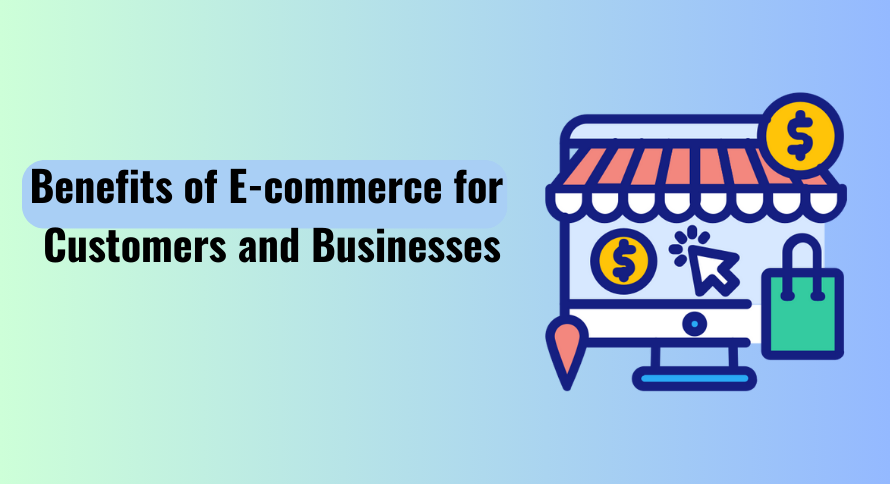
In the digital age, e-commerce has revolutionized the way we shop and conduct business. Whether you’re a customer looking for convenience or a business owner seeking growth opportunities, the benefits of e-commerce are undeniable.
In this comprehensive guide, we will explore the multifaceted advantages of e-commerce for both customers and businesses.
The E-commerce Revolution
E-commerce, short for electronic commerce, refers to the buying and selling of goods and services over the internet. It has transformed the traditional brick-and-mortar shopping experience into a virtual marketplace, creating a win-win situation for customers and businesses alike. Let’s delve into the myriad benefits of e-commerce:
Benefits for Customers:
Convenience: Perhaps the most apparent benefit of e-commerce for customers is convenience. Shoppers can browse, select, and purchase products from the comfort of their homes or while on the go. This eliminates the need for time-consuming trips to physical stores, saving both time and effort.
24/7 Accessibility: E-commerce platforms are accessible round the clock, allowing customers to shop at any time that suits them. This is especially beneficial for individuals with busy schedules, night owls, or those in different time zones.
Wider Product Selection: E-commerce opens the door to a vast array of products from different sellers and regions. Customers can easily explore and compare products to find the best deals and unique items that may not be available locally.
Personalization: E-commerce websites often employ advanced algorithms to personalize product recommendations based on a customer’s browsing and purchase history. This tailored shopping experience enhances customer satisfaction.
Ease of Price Comparison: Online shoppers can quickly compare prices across multiple e-commerce platforms, helping them find the most competitive deals and save money.
User Reviews and Ratings: E-commerce websites often feature user-generated reviews and ratings for products. This valuable feedback helps customers make informed decisions and fosters trust in the online shopping experience.
Convenient Payment Options: E-commerce platforms offer a variety of secure payment options, from credit cards to digital wallets, making transactions quick and hassle-free.
Ease of Returns and Refunds: Many e-commerce businesses have streamlined their return and refund processes, making it easier for customers to return items and receive refunds when needed.
Reduced Pressure to Buy: Online shopping eliminates the pressure often associated with in-store shopping, where salespeople may push customers to make a purchase. Customers can take their time and make well-thought-out decisions.
Benefits for Businesses:
Global Reach: E-commerce transcends geographical boundaries, allowing businesses to reach customers worldwide. This expanded market potential can significantly boost sales and revenue.
Lower Overheads: Traditional retail businesses require physical storefronts, which come with rent, utilities, and maintenance costs. E-commerce businesses can operate with significantly lower overhead expenses.
24/7 Operations: E-commerce stores are always open, providing a constant revenue stream. This can lead to increased sales and a more efficient use of resources.
Targeted Marketing: E-commerce platforms collect valuable customer data, enabling businesses to target their marketing efforts more effectively. Personalized marketing campaigns can result in higher conversion rates.
Inventory Management: E-commerce systems often integrate with inventory management software, helping businesses optimise their stock levels, reduce excess inventory, and prevent stockouts.
Reduced Marketing Costs: Digital marketing and social media advertising can be more cost-effective than traditional advertising methods, making it easier for businesses to promote their products and services.
Customer Insights: E-commerce analytics tools provide businesses with valuable insights into customer behaviour and preferences. This data can inform product development and marketing strategies.
Scalability: E-commerce businesses can easily scale their operations up or down to accommodate changes in demand. This flexibility is especially valuable during peak seasons or unexpected events.
Reduced Transaction Costs: Online transactions often have lower processing fees compared to in-person transactions, contributing to higher profit margins.
The Synergy Between Customers and Businesses:
E-commerce represents a symbiotic relationship between customers and businesses. Customers benefit from the convenience, variety, and accessibility of online shopping, while businesses enjoy global reach, reduced costs, and data-driven insights. This synergy has propelled the e-commerce industry to unprecedented heights.
Challenges and Future Trends:
While the e-commerce benefits are abundant, it’s important to acknowledge the challenges, such as cybersecurity threats, competition, and the need for continuous innovation. Businesses must adapt to evolving technologies and customer preferences to remain competitive.
The future of e-commerce is expected to be shaped by trends like augmented reality shopping experiences, voice commerce, and sustainability initiatives. As the industry continues to evolve, both customers and businesses can look forward to even more exciting opportunities and benefits.
Conclusion:
E-commerce has undeniably transformed the way we shop and conduct business. Customers enjoy convenience, a wide product selection, and personalized experiences, while businesses benefit from global reach, reduced costs, and data-driven insights. As the digital landscape continues to evolve, e-commerce will remain a cornerstone of modern commerce, offering a plethora of advantages for all stakeholders involved. Embracing e-commerce is not just a choice but a necessity for businesses looking to thrive in the digital age.

